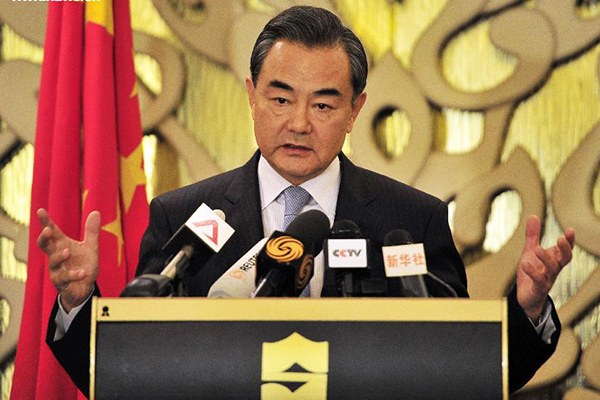
Foreign Minister Wang Yi addresses a news conference in Singapore, Aug 3, 2015. Wang visited Singapore from Aug 2 to 3.[Photo/Xinhua]
SINGAPORE — Visiting Foreign Minister Wang Yi said in Singapore on Aug 3 that China is committed to working with ASEAN (the Association of Southeast Asian Nations) members to implement the Declaration on the Conduct of Parties in the South China Sea (DOC) and enhance consultations on the Code of Conduct (COC) to maintain peace and stability of the sea.
Wang Yi, who is on a two-day visit to Singapore, made the remarks at a news conference.
Stressing that China and ASEAN have agreed to adopt the dual- track approach in resolving the South China Sea issue, the foreign minister said that parallel progress has been made along DOC and COC, with measurable progress already achieved during the 9th China-ASEAN senior officials’ meeting in Tianjin days ago.
On the COC, for example, all parties agreed the COC consultation will enter into the new phase of discussing crucial and complex issues. China and ASEAN will begin working on common elements in producing a COC framework, he said.
During the meeting in Tianjin, senior diplomats from China and Southeast Asia also agreed to set up an eminent persons and experts group (EPEG) as soon as possible to provide expertise to the COC consultation, as well as two hotline platforms between China and ASEAN countries, which will focus on maritime search and rescue as well as respond to maritime emergencies, the minister said, adding that they also agreed to begin to develop some preventive measures in response to risks at the South China Sea before the conclusion of the COC.
In terms of implementing the DOC, Wang said that China and ASEAN countries agreed to cooperate in the areas of maritime navigation safety and search and rescue, maritime science and combating transnational crimes to advance China-ASEAN cooperation.
“It took 10 years from the first proposal to the idea of DOC to the final completion of its negotiation, and it has been less than two years since the idea of COC was first raised, and already so much progress has been made, which in my view is really significant,” Wang stressed.
“It’s the result of the joint efforts of China and ASEAN countries. It’s also a test to China’s sincerity of COC consultation. We welcome non-regional countries to support the COC consultation, but we don’t welcome non-regional countries to make improper remarks on COC consultation,” he emphasized.
Noting the South China Sea has been under spotlight in recent years, Wang said that the South China Sea is not an issue between China and ASEAN as a whole. Therefore, it should not affect the overall interests of China-ASEAN cooperation.
“We have agreed a clear approach to resolving the South China Sea issue, it’s the dual-track approach advocated by China. That is, the directly concerned states will properly resolve the South China Sea issue through peaceful negotiation, and in the meantime, China and ASEAN countries will work together to maintain peace and stability of the South China Sea,” Wang said, adding that the senior officials meeting for implementing the DOC, and the joint working group for advancing consultation toward a COC have been operating smoothly in addressing the South China Sea issue.
“At the moment, the general situation in the South China Sea is stable and China is steadfastly committed to working with the parties to maintain the situation which has not come easily. And we will never allow any country to destabilize the South China Sea, “ he said.
Also at the news conference, the foreign minister stressed that the nine-dash line should not be the focus of the South China Sea issue, and the focus of the issue is the territorial disputes triggered by the illegal occupation of the islands and reefs that belong to China’s Nansha Islands.
The nine-dash line was promulgated by the then Chinese government in 1940s and it has been upheld by the successive governments in China, the minister said.
Wang reiterated China’s positions on the South China Sea, saying China is committed to upholding peace and stability in the South China Sea, peacefully resolving the disputes by ways of negotiation and consultation, managing the differences through developing rules and mechanisms, maintaining the freedom of navigation and flyover and generating win-win results through cooperation.
Stressing that China is also committed to resolving disputes through negotiations with directly concerned countries, Wang who will attend foreign ministers’ meetings on east Asian cooperation in coming days in Malaysia, also pointed out that the foreign ministers’ meetings are not the proper platforms to solve the disputes.
“China has never believed those multilateral forums are the appropriate place for discussing specific bilateral disputes, and our experience so far is that attempts to do so cannot help resolve the underlying issues.”
